

The power of beliefs: lay theories and their influence on the implementation of CLIL programmes - ePrints Soton. The power of beliefs: lay theories and their influence on the implementation of CLIL programmes CLIL is one of the most dynamic pedagogic trends in language teaching in Europe and yet, the enthusiasm with which this innovation is implemented by stakeholders and “made a success” is not fully understood.

In this paper we argue for an investigation of CLIL implementation as a form of extended language policy (Spolsky 2004), which relates language management, practice and beliefs, and so expands the notion of policy well beyond top-down legislation. In this contribution, the suggested centrality of beliefs to CLIL policy analysis will be shown by a detailed investigation into the lay theories of teachers and learners involved in CLIL instruction in Austrian upper secondary colleges of technology, which traditionally attract students considered as relatively unsuccessful foreign language learners.
The power of beliefs: lay theories and their influence on the implementation of CLIL programmes - ePrints Soton. Manuale Digitale - Vizualizare manuale. My 6 TOP tips for taking tests and exams. Cglearn.it. Early Years Experience songs for children - Weather theme - other themes include action, transport, food, nursery rhymes, animals, weather. Blow, wind, blow!
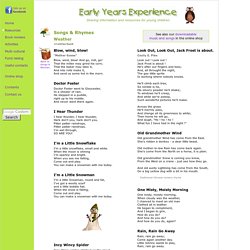
"Mother Goose" Blow, wind, blow! And go, mill, go! That the miller may grind his corn; That the baker may take it, And into rolls make it, And send us some hot in the morn. Doctor Foster Doctor Foster went to Gloucester, In a shower of rain. I Hear Thunder I hear thunder, I hear thunder, Hark don't you, hark don't you. I'm a Little Snowflake. AutoDidact - Manuale. LearnEnglish - British Council. Section 1 - “Where did you go?”
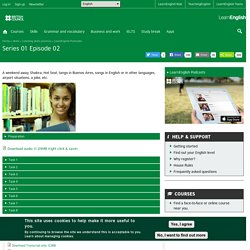
– a weekend away Tess: Hello and welcome to LearnEnglish Elementary podcast number two. I’m Tess. Materiale gratuite - Uniscan. Manual - Limba Modernă Engleză - clasa a IV-a, semestrul al II-lea. Butoanele de navigare.
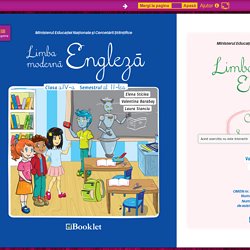
Manual - Limba Modernă Engleză - clasa a IV-a, semestrul I. Butoanele de navigare.
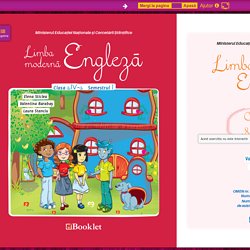
Pre-birth to Three: Observation, Assessment and Planning. One theory all teachers with disruptive children should know about. Imagine a classroom where children are unable to wait their turn or stay focused on their work.
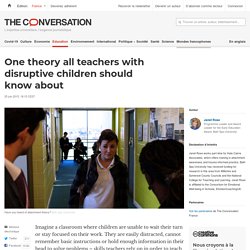
They are easily distracted, cannot remember basic instructions or hold enough information in their head to solve problems – skills teachers rely on in order to teach successfully. These behavioural issues are all examples of problems that can arise from attachment issues – based on the relationship between children and their main caregiver. Attachment theory is now one of the world’s most well-researched theories about human development. It was first proposed by the 20th-century British psychiatrist John Bowlby, who considered that children needed to develop a secure attachment with their main caregiver via sufficiently consistent, responsive, sensitive, appropriate and predictable care and support.
Research has shown that secure attachments create mental processes that enable a child to regulate emotions and attune to others. Trauma takes its toll. Don't Expect Toddlers To Behave Consistently — They Literally Can't. Can Free Play Prevent Depression and Anxiety In Kids? Over the past 50-60 years, play time in kids’ lives has been drastically cut.
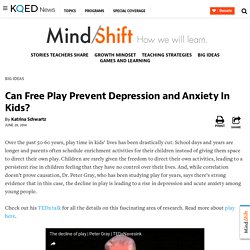
School days and years are longer and parents often schedule enrichment activities for their children instead of giving them space to direct their own play. Children are rarely given the freedom to direct their own activities, leading to a persistent rise in children feeling that they have no control over their lives. And, while correlation doesn’t prove causation, Dr. Peter Gray, who has been studying play for years, says there’s strong evidence that in this case, the decline in play is leading to a rise in depression and acute anxiety among young people. Check out his TEDx talk for all the details on this fascinating area of research. Which Early Childhood Experiences Shape Adult Life? By Maanvi Singh, NPR Most of us don’t remember our first two or three years of life — but our earliest experiences may stick with us for years and continue to influence us well into adulthood.
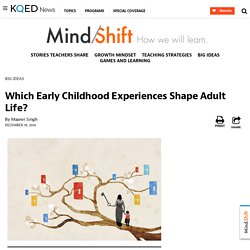
Why Empathy Holds the Key to Transforming 21st Century Learning. By Thom Markham Like other aspects of modern life, education can make the head hurt.
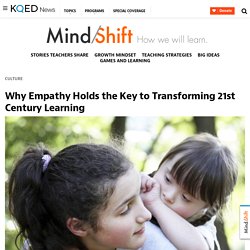
So many outcomes, so much important work to do, so many solutions and strategies, so many variations on teaching, so many different kinds of students with so many different needs, so many unknowns in preparing for 21st Century life and the endless list of jobs that haven’t been invented. What if we discovered one unifying factor that brought all of this confusion under one roof and gave us a coherent sense of how to stimulate the intellect, teach children to engage in collaborative problem solving and creative challenge, and foster social-emotional balance and stability—one factor that, if we got right, would change the equation for learning in the same way that confirming the existence of a fundamental particle informs a grand theory of the universe?
That factor exists: It’s called empathy. Practical tips. By Opal Dunn, educational consultant and author Introduction Young children learn English differently from most adults.

Most have an innate ability to pick up English while taking part in activities, by making sense of what they are doing and picking up the adult’s language that accompanies the activity. You can find out more in the British Council booklet ‘How young children learn English as another language’, also available on the parents pages of the LearnEnglish Kids website. Planned English sessions You can plan regular sessions which will usually take place: Key Person & Attachment - Early Years Matters.
The Key Person Children thrive from a base of loving and secure relationships. This is normally provided by a child’s parents but it can also be provided by a key person. A key person is a named member of staff with responsibilities for a small group of children who helps those children in the group feel safe and cared for. The role is an important one and an approach set out in the EYFS which is working successfully in settings and in Reception classes. How Are Happiness and Learning Connected? As teachers, we also know that when students' affective filters or defenses are sky high, fight or flight responses will be modus operandi. A room full of defensive behaviors (withdrawn, angry) is a sad, unproductive place to teach and learn. Now let's flip it and take a look at how much more we are able to learn when we are in harmony with the people and things in any given educational environment.
Being in harmony means feeling safe, feeling valued and a necessary part a group, and in this case, a learning community. Learning Time with Shaun & Timmy - British Council - Home. Over in the Meadow. Brown Bear What Do You See? (By Bill Martin Jr & Eric Carle) Bedtime Stories Read Aloud. Brown Bear What Do You See? (By Bill Martin Jr & Eric Carle) Bedtime Stories Read Aloud. Room On The Broom - Audio Book. Giraffes Can't Dance. Giraffes Can't Dance. Michael Rosen performs We're Going on a Bear Hunt. Whole Child Development Is Undervalued. The question is how to make such an approach both systemic and sustainable. Whole Person Socio-emotional, physical, creative, and cognitive capacities are deeply intertwined and equally important in ensuring a child's wellbeing, learning, and growth.
(That shouldn't be a surprise to anyone studying or supporting children's learning.) Nobel laureate James Heckman, a professor of economics at the University of Chicago, has shown that the non-cognitive skills emerging in early childhood are among the strongest predictors of adult outcomes. And Paul Tough, author of How Children Succeed, has continued to emphasize the crucial role that soft skills play in character formation and building on persistence, curiosity, and even grit -- the "passion and perseverance for very long-term goals," according to psychologist Angela Lee Duckworth.
School Radio - Nursery songs and rhymes. Music and Movement Activities for Toddlers and Preschoolers. 45+ Quick & Easy Kids Crafts that ANYONE Can Make! - Happiness is Homemade. LearnEnglish Kids. LearnEnglish Kids. How to teach children English using illustrated storybooks.
What makes illustrated storybooks such a good resource for teaching young learners of English? The British Council’s Gail Ellis, co-author of a storytelling handbook for primary English language teachers, explains. Listen to an interview with Gail in our podcast and register for her webinar taking place on Thursday, 2 October. Illustrated storybooks provide an ideal resource for helping children learn English. This is because children love listening to stories. Ey making mark matters76708 1. Practical tips. The power of positive relationships. Talking with Babies and Toddlers June05. PowerfulInteractions. Effective Teacher-Child Interactions.
Carol Dweck: The power of believing that you can improve. How can parents and teachers best educate young children? What principles can both teachers and parents bring to the education of very young children? Gillian Craig, who was part of the Learning Time with Shaun and Timmy writing team, explains. As teachers and parents, we follow certain principles in our roles. Often though, these principles overlap and all we need to do is recognise and reinforce these areas. Ask (the right) questions When my daughter came out of her class one day shortly after her course started, I asked her, 'What did you do in class today?
'. Although my daughter is only two years old, (and more experienced parents than me would not have asked such a broad question to start with), questioning our children at any age about what they have done in class is a natural thing to do. Similarly, a child’s artwork can provide a prompt for asking questions: 'What (or who) is it? ' Teachers also want their students to reflect on their lessons, but with young children especially, this is a learned skill.
Reinforce desirable behaviour. Schemas in Children’s Play - N a t u r e P l a y. Written by Clare CaroSchemas in Children’s Play are such an important concept when it comes to the development of our children that it’s worth taking the time to understand them so you can facilitate them when you see them.What are these schemas? Well it’s really a fancy word for the urges that children have to do things like climb, throw things and hide in small places. They appear through play; perhaps it is the way they choose to do things, or what they desperately need to do out of the blue! Bringing It All TogetherAfter looking at each schema individually to get to grips with what each 'urge' is all about we may already be able to recognise some of the different ways they can appear in your child.Rotation, Trajectory, Enveloping, Orientation, Positioning, Connection, Enclosure/Container, Transporting and Transformation are urges that show in all children starting as early as their first birthday, some times before.How Can Knowing About These Urges Help Us?
I Said I Want the Red Bowl! Responding to Toddlers' Irrational Behavior. Pin It Amelia, told that she can’t have a fifth book before bedtime, shouts: “You are the meanest mommy! You are not invited to my birthday party!” Derek, when offered a choice between carrots and cheese, not ice cream, before dinner announces: “I don’t like the choices you are choicing me!” Alex hurls a bowl of his favorite cereal off the table and screams, “I said the red bowl, not the blue bowl!”
If any of these exclamations sounds familiar, you are not alone. Does my toddler have a short attention span because she won’t sit still for a story? A: It is perfectly normal for toddlers to not sit still very long—period. Ey besd. B480 Special Need Publication A4 V5 Final MR. Neurodiversity TfS online conference. Teaching English to learners with Special Educational Needs (SENs) – Myths and realities. ‘I know I have children with special educational needs in my class, I want to help them and we are supposed to promote inclusion, but I really am not sure how to do this’ Vera, primary teacher from Spain. You speak with an accent. I don’t.
Accents are things that only other people have. The natives and the speakers. Let me start with the good news. We are, all of us without exception, native speakers. This may come as a surprise to those of us who have had close encounters with the second/foreign language world, but is nonetheless true. ZERO TO THREE. Symbolic play and language development - ScienceDirect. 1. Introduction 1.1. Scientists Say Child's Play Helps Build A Better Brain : NPR Ed. The cognitive benefits of play: Effects on the learning brain. © 2008 - 2014, Gwen Dewar, Ph.D., all rights reserved. The magic of child-directed play.
Play to Learn: Discussion. Play to Learn. Why play-based learning? (free article) - Early Childhood Australia. Importance of play for babies & children. How young children learn English through play. ZERO TO THREE. Deb Roy: The birth of a word.
Listen to Your Mother. Let's Talk. Why does my toddler love repetition? - BabyCentre UK. How can I help my child to start talking? (Video) - BabyCentre UK. What Parents Can Gain From Learning the Science of Talking to Kids. Patricia Kuhl: The linguistic genius of babies. Alison Gopnik: What do babies think? How young children learn English as another language. How do you speak 'Motherese'? The Woman Who Changed Her Brain: Barbara Arrowsmith-Young at TEDxToronto.